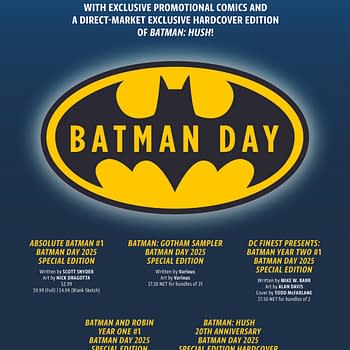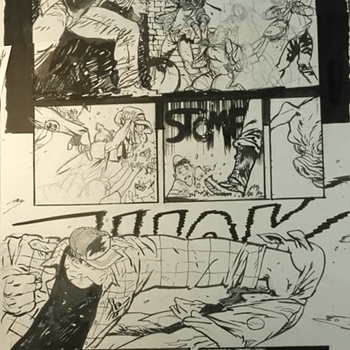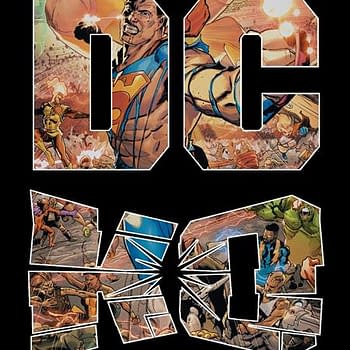Posted in: Recent Updates | Tagged: Alan Moore
How The Comic Industry Went To War With Itself – And Won!

Steve Bissette has gathered a wonderful folder of posts looking at one of the great-but-in-danger-of-being-forgotten battle of the comics industry. Ratings.
In the late eighties, the comic book industry, and specifically DC Comics was moving towards a universal rating system for comic books distributed to comic stores, designed to protect against what were seen as political and legal threats against content in comic books. This was at a time when Vertigo was still an unnamed not-even-an-imprint at DC, all mixed up with DC Universe continuity. Marvel Comics published the wonderful and much-missed Epic Comics, their own version of the adult comic Heavy Metal. Elfquest was showing sex, Miracleman was showing birth, The Dark Knight was showing nipples and saying "shit", Omaha The Cat Dancer was showing… cat sex, Fantagraphics were pushging Love & Rockets and Howard Chaykin's Black Kiss was on the way. Mainstream comic books were beginning to push an envelope that had previously been the purview of underground comics. And a comic shop, Friendly Franks, has been busted for selling comics featuring homosexual scenes.
In light of concerns from Steve Geppi and Diamond Comics Distributors, a company that to this day is incredibly risk-averse when it comes to any legal matters, DC were going to introduce a new ratings and guidance system to their comics that might have seen any adult content banished to the hinterlands. Steve Bissette recalls how Frank Miller first got a copy of DC's memo regarding the new ratings and rallied the troops from Alan Moore to John Byrne, Moebius to Walt Simonson, to add their names to an announcement in CBG against the incoming practice, without any creative consultation, and wrote a letter to publisher Jeanette Kahn, which Bissette publishes for the first time.
Bissette also posts the memo, in which Kahn states that all DC Comics will now have a For Universal Readership or Suggested For Mature Readers labels. And that this would enable the publisher and creators to take risks, but protect and "the purchaser".
Subsequently DC contacted CBG to tell them that three labels, Universal, Mature Reader and Adult, the latter having controlled distribution. And details of the Universal label seemed incredibly restrictive – certainly today there are few superhero comic books that would fit that pattern. And even then, the likes of many popular books would have fallen foul of them.
If the creators had gone along with DC and the distributor's wishes, it is likely that the emerging older market may have been strangled, despite everyone's best intentions. Challenging stories and artwork would have been squashed, retrained and strangled, killed by a market that would be averse to order them. And many much loved comics, those that pushed the medium, may not have even been created if a universal comics rating had been self-imposed across the industry.
And as Bissette points out, it was a copy of Heavy Metal that caused the whole Friendly Frank's legal case in the first place.
But by publicly resisting, demonstrating that they weren't taking this kind of thing lying down and indeed pulling their labour from DC Comics, they showed that a move to universal ratings was impossible. They gave other publishers reasons not to embrace it. They basically took the industry, divided and conquered. As a result, many publishers including DC do use ratings, but their own individual versions. Which means there's a competitive edge regarding content, what is acceptable from publisher to publisher, and no one pushing down hard from above to make everything… flat.
There are still vestiges of course. No one seems realistically to be suggesting a universal comics rating system anymore, but the dominant distributor then, Diamond, now has near-monopoly status, and distributing almost all comic books to comic shops, with exclusive rights to all the main publishers. And their Adult catalogue, a place for very sexually explicit comic books, has recently turned online only, and some titles with more mainstream appeal have found themselves trapped inside with no escape. However they haven't managed to impose a rating of guideline across the industry before they agree to distribute the book. Not that much, anyway…
There's a lot more to come from Bissette it seems – and he's promising a chunk of John Byrne goodness later this week, to boot.
UPDATE: Steve Bissette lays down a timeline and Colleen Doran posts the page that was described as pornography. It isn't.

















